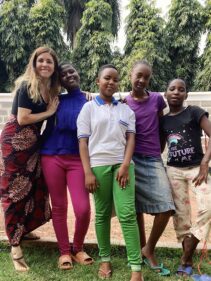
In 2010, Regina Guzman Correa was pursuing a Master’s in Public Diplomacy at the University of Southern California. With a BA in Communication Studies and Art History already under her belt, and a developing career in the world of museums, the degree represented a slight change of direction. But she had no idea that a four-month internship would prove the most influential aspect of the programme.
“I spent the summer of 2010 in a small village in Tanzania, helping with a local micro-finance programme. The village was a tiny place, with no electricity or running water. Free primary education had just been introduced by the government, but its roll out was very slow and it took a while to reach rural communities. So there were loads of kids running around who weren’t in school, and we spent every afternoon with them.”
When Regina returned to the United States, she and fellow student Katie Moorehead were determined to find a way of supporting the education of the children they had come to know. So they set up an initiative which quickly became known as the Waka Waka Project.
“The year that we were there, the World Cup was held in South Africa and Shakira’s Waka Waka song was everywhere. The children all went mad every time it was played, and it just felt like the only possible name, especially when we discovered that in Swahili ‘waka’ means ‘light’, or ‘spark’, which is exactly what education can provide.”
For the past 12 years the Waka Waka Project has supported the same group of 15 children, sponsoring them to attend private English medium schools. Several of this first cohort have now begun university degrees, a significant achievement in a country where just 34% of the population complete secondary education and less than 2% of the workforce have university degrees.
“Lots of children have to drop out of the government system for various reasons, but non-formal schooling that would allow them an alternative route to education is very under-funded, and private schools are expensive. Also, while primary education is in Swahili, there’s an abrupt switch to English at secondary level, so 70% of children drop out before completing basic education as the language of instruction makes it very difficult to learn and pass examinations.”
For over a decade Regina has returned to Tanzania each summer to reconnect with the children, to visit schools and meet with their teachers, and to see the wider impact of the project. From the beginning, she and Katie decided to offer depth of opportunity to a small number of children whom they could commit to supporting for the long-haul, rather than providing more limited help to a greater number. However, there has been a spillover effect on the wider community, from parents being able to save up to send younger siblings to private school, thanks to the sponsorship of an older child, to a room originally built to provide space to complete homework, which now fulfils multiple village functions.
“It’s a very personal project,” explains Regina. “Almost all of our funding comes from donations from individuals, and we send all of our supporters regular updates so that everyone can see the direct impact even a small amount of money can have. We’ve been able to change these 15 lives through education.”
For Regina herself, the project has generated a deep long-term interest in education in sub-Saharan Africa, which has shaped much of her life following that first visit. She completed a Master’s in Development Studies at the LSE in 2020, and is now in the third year of a PhD in Education at Darwin.
“I’m focusing on secondary education, and the policies around non-formal education in Tanzania. I never realised how privileged I was with the education I had until I saw what it’s like to be ten years old and not go to school.”
